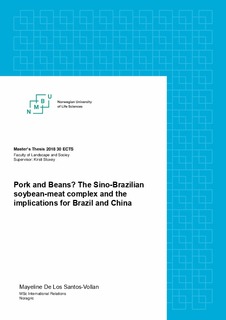| dc.contributor.advisor | Stuvøy, Kirsti | |
| dc.contributor.author | De Los Santos-Vollan, Mayeline | |
| dc.date.accessioned | 2019-05-10T14:03:00Z | |
| dc.date.available | 2019-05-10T14:03:00Z | |
| dc.date.issued | 2019 | |
| dc.identifier.uri | http://hdl.handle.net/11250/2597290 | |
| dc.description.abstract | This thesis addresses the integration of the Brazilian soybean sector and the Chinese pork sector into a cross-border soybean-meat complex. The relationship of Brazil and China is defined by the integration of the Brazilian soybean sector and the Chinese pork sector. China’s demand for soybean stems from rapid urbanization along with dietary transitions that have increased pork production. China produces pork on industrial levels, and its demand for imported soy to feed the pigs has increased exponentially. Brazil has been able to meet the soybean demands, leading to the integration of the Chinese pork sector and the Brazilian soybean sector into an interdependent relationship. The Sino-Brazilian relationship is studied through complex interdependence which highlights the emergence of transnational actors, the rise of international regimes and institutions and studies how these actors are responsible for changes in the relationships between states, by making them more complex. The Sino-Brazilian relationship has developed asymmetrically drawing attention to power distribution within the relationship and who holds what power. The concept of complex interdependence is used to assess the characteristics of the relationship.
The production and consumption centers in Brazil and China draw attention to the participation of transnational corporations influencing the soybean global trade. Traditional dominance of the soybean international trade in the hands of US-based transnational corporations in decreasing, highlighting the emergence of new actors contributing to the restructuring of the soybean industry. New sources of power emerging from Latin American and East Asia come to challenge the dominance of the US-based transnational corporations. In order to understand the interdependence of Brazil and China, as well as the changing landscape of the soybean, Brazil, China, and the transnational corporations involved need to be examined in detail. Ultimately this research finds that the emergence of new actors has effectively changed the landscape of the soybean industry through restructuring of power distributions and redirecting trade flows. Yet, the involvement of transnational corporations is unlikely to change. The reasons are the essential financial support to Brazilian soybean production, the high degree of control over technology and distribution channels, and the ongoing Sino-Brazilian interdependence. | nb_NO |
| dc.language.iso | eng | nb_NO |
| dc.publisher | Norwegian University of Life Sciences, Ås | nb_NO |
| dc.rights | Attribution-NonCommercial-NoDerivatives 4.0 Internasjonal | * |
| dc.rights.uri | http://creativecommons.org/licenses/by-nc-nd/4.0/deed.no | * |
| dc.title | Pork and beans : the Sino-Brazilian soybean-meat complex and the implications for Brazil and China | nb_NO |
| dc.type | Master thesis | nb_NO |
| dc.description.version | submittedVersion | nb_NO |
| dc.source.pagenumber | 65 | nb_NO |
| dc.description.localcode | M-IR | nb_NO |

